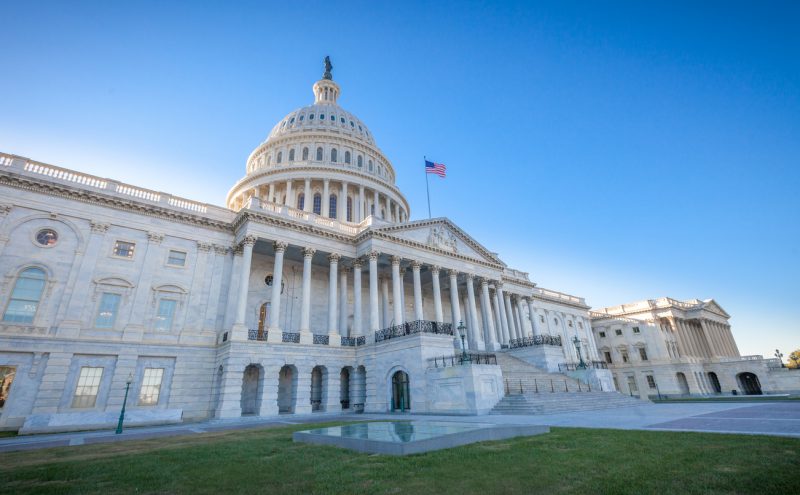The looming threat of a government shutdown means agencies are once again reviewing contingency plans — in the event that lawmakers don’t pass a spending bill by Friday.
The on-again, off-again threat of a shutdown has become the new normal for feds, who have been operating under a continuing resolution since December 2016. That short-term spending bill is set to expire on April 28 at midnight.
Last week, White House Press Secretary Sean Spicer said the Office of Management and Budget is taking routine steps to prepare “in the unlikely case that there’s a lapse in appropriations.”
But news reports seem to paint a different picture — one that is less certain about how the budget negotiations will play out. The White House has been clear about President Donald Trump’s budget priorities, including funding for a wall along the U.S.-Mexico border and greater latitude to deny federal grants to so-called sanctuary cities.
“Democrats have insisted that they will not vote for any spending bill that gives the White House money or flexibility to begin construction of a border barrier,” according to The Washington Post. “They believe that the GOP will have to either abandon Trump’s demand or assume political responsibility if a shutdown occurs.”
One bright spot is coming from a bipartisan group of lawmakers who are calling for a “clean” spending bill, meaning no funding for the border wall or other partisan riders. How this all plays out is yet to be seen. And although there’s sure to be a lot of political back and forth leading up to the midnight deadline, we’ll stick to the key issues that all feds should know leading up to a possible shutdown.
1. Your office needs to plan for this shutdown, but even those plans may change. Until Congress finalizes the stopgap bill, your agency needs to keep planning for a government shutdown. While many who work at your office will have experienced the 2013 government shutdown, there are likely new people on staff. They’ll need guidance on how a shutdown could affect their jobs, pay and benefits. Even staff who persevered through the previous shutdown will need reminders about what to expect.
However, keep in mind that even the best plans can change. For example, during the 2013 shutdown, mailroom employees at the National Institutes of Health were initially furloughed. But NIH realized that some mailroom employees were needed to pick up mail, including bills that needed to be paid to keep the facilities minimally operational. NIH brought some mailroom employees back to work as a result.
2. If you haven’t already, familiarize yourself with your agency’s contingency plan. These plans detail what operations your agency will continue to perform in the event of a shutdown, as well as the types of employees who will be furloughed (given a temporary leave of absence). Agency plans also explain what’s expected of both furloughed employees and those not furloughed, and how staff and the public will be notified about changes to agency operations.
3. Make sure your contact information is up to date, in case your manager needs to contact you during a shutdown. At the very least, employees would need to be notified about resuming operations after the furlough ended.
4. Review any travel plans with your manager. Employees with work trips scheduled should coordinate with their supervisors on how to proceed in the event of a shutdown.
5. Beware of the Antideficiency Act. One of the key issues agencies must weigh during a shutdown is what programs and activities they are permitted or required to continue. “Except in certain circumstances when continued activities are authorized by law, the Antideficiency Act generally restricts agencies from continuing operations funded by annual appropriations during a government shutdown,” according to a 2014 Government Accountability Office report. But there are exceptions, including activities funded with appropriations that do not expire at the end of the fiscal year.
6. Some lawmakers in Congress are thinking about the financial impact a shutdown would have on feds. Sen. Ben Cardin, D-Md., introduced a bill to ensure that if the government shuts down, employees would get back pay once agencies reopened. “The Federal Employee Fair Treatment Act would guarantee back pay for all employees, whether or not they had been considered essential and forced to work during the closure or had been furloughed,” according to Government Executive
GovLoop Editorial Fellow Michael Steinberg contributed to this report.





I think it is ridiculous that those of us rank-and-file federal employees are continually being targeted by the GOP as though most of us are over paid and under worked. Coming this close to another shutdown only highlights the main fact that Congress is the main cause for the problems we are experiencing. There have been unfunded Congressional mandates that divert funds from ongoing programs and projects, there was the pay freeze (and yes President Obama went along with it), there have been budget cuts to agencies that needed increases like IRS. Its easy for them to hit us because we can’t effectively fight back. Too many non-feds believe the lie about us and the current administration has not only fostered that lie but increased the impact, while showing that he has no clue how to run the government and is mismanaging the budget and agencies in trying to increase the DoD budget.
I just read that those with professional and doctoral degrees are underpaid in the public sector when compared to the private sector.
It is those who a high school diploma or less that make more in the government than elsewhere.